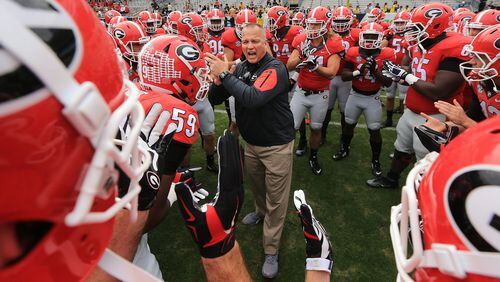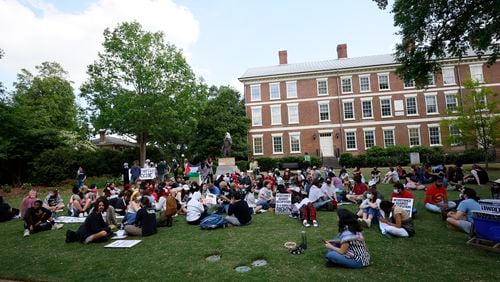UGA Athletic Director Greg McGarity told the world he was quietly driving home from Atlanta last Saturday — after Georgia defeated Georgia Tech — when he finally made up his mind: coach Mark Richt had to go.
That may be true in the strictest sense. But in fact the carrion birds had circled over the University of Georgia’s football coach for weeks, possibly months.
The Atlanta Journal-Constitution’s reconstruction of Richt’s firing provides a glimpse into the high-stakes, high-pressure world of major college football in the South. In the end, of course, the fate of the much-loved, deeply religious Richt came down to a very cold calculation: spreading the gospel and building character in players are admirable qualities, but you’re being paid $4.1 million a year to win football games.
And so Richt will receive an additional $4 million buyout to leave a program that he led for 15 years and was hoping to stay with. A close associate said Friday that Richt was not expecting to get the sack on Sunday, particularly after his team won the Tech game, 13-7, the day before. He’d thought the Tech victory might buy him another year at UGA, said the friend, who asked not to be identified because he was not authorized to speak for Richt.
McGarity said that after his long drive home Saturday night, he and Richt spoke by phone and agreed to meet in the morning. This was McGarity’s decision, ratified by university President Jere Morehead, officials said. Certainly there was a clamor among some very powerful and well-connected people, including some on the state Board of Regents, to dump Richt.
If McGarity was certain, the deeply divided Bulldog Nation was not. And McGarity’s decision was not without irony.
“Every day for the past few weeks, I heard from people asking for Mark Richt to be fired,” one regent told the AJC. The regent would only speak under the condition of anonymity. “When it happened, the question was, ‘Why did y’all fire coach Richt?’”
A tepid endorsement, a giant raise
McGarity touched off a cascade of changes on Sunday when he announced Richt’s departure. Days later, the defensive coordinator at Alabama was hired as the new head coach. (The appointment of Kirby Smart is not yet official, but is likely to be announced as early as today or Monday.) And on Friday, the University of Miami was giving a warm welcome to its new head coach, Mark Richt.
Although the most dramatic action was compressed into that single wild week, the whole affair seems to have been a long time in the making. The clues to Richt’s undoing began to crystallize as much as a year ago.
First came a half-baked endorsement from McGarity in response to a question from the AJC’s Mark Bradley: is Richt capable of winning a championship?
“Until I’m convinced he is not, then I believe he can,” McGarity replied.
The next clue: after McGarity’s sideways endorsement, Richt received an $800,000-a-year raise, a contract extension and a commitment of more money for his program. In the workaday world outside major college football, the raise was astounding: it would take the average wage-earner in Georgia more than 16 years to make $800,000. As for Richt’s total annual salary, $4.1 million, well, ordinary Georgians can work for a lifetime and never see that much money. The lion’s share of Richt’s salary and bonuses is paid by the UGA Athletic Association, a private entity. The association is also paying for the $4 million buyout.
Last January’s big raise was good news for Richt, but there was an implicit message.
Win.
Some may say that the 9-3 season that followed was hardly a firing offense, but those numbers don’t tell the story.
Some stinging losses, and a quick trip
Sometime during the 2015 season — likely near its midpoint — McGarity stopped believing.
The Athens native and UGA graduate has been athletic director more than five years, overseeing about 20 teams, working with the school president and athletic board on budgets and the hiring and firing of coaches.
Some suspect McGarity lost faith after the embarrassing loss to Florida on Halloween Day, but others pointed to the entire dreadful month of October.
For the month, Richt was 1-3, losing to SEC rivals Alabama, 38-10; Tennessee, 38-31; and the hated Gators, 27-3. Richt started his third-string quarterback in the Florida game and then watched him throw four interceptions. The Bulldogs barely defeated Missouri 9-6 in their lone October victory and had to do that without scoring a single touchdown.
Perhaps realizing that he was in trouble, two weeks after the Florida game Richt took a quick cross-country trip to Washington state. There he had breakfast with his star recruit for 2016, the phenom high school quarterback Jacob Eason, and tweeted a photo of the two of them, Eason’s arm slung around Richt’s shoulder.
Many observers read that as Richt sending a message to his bosses: If you keep me, you keep Eason. Let me go, and you also may be letting go one of the nation’s No. 1 quarterback prospects.
By Friday of this week, sports bloggers and tweeters were positing that Eason might indeed follow Richt to Miami, although Eason has said nothing about going back on his commitment to Georgia.
‘Please. Who did we beat this year?’
Georgia played four games after the Florida debacle and won all of them. But the get-him-gone chorus continued to build. These last four wins were often unconvincing victories, such as the 23-17 overtime decision over the weaker Georgia Southern.
The team’s emotional reaction to the Georgia Southern win was viewed by many as a sign of diminished expectations.
“Please,” said one major donor. “This is the University of Georgia. Who did we beat this year? Vanderbilt? Kentucky? And we’re excited about beating Georgia Southern in overtime?”
On a Thursday in early November, Morehead, UGA’s president, was at an Atlanta event when he was approached by a reporter.
“I’m not going to ask you about Mark Richt,” quipped the writer.
“That will make you the only one,” Morehead answered.
Some ‘extremely disenchanted’ big shots
Georgia football brought in $60 million in net income in the fiscal year that ended in June — $60 million — and it bankrolls all other athletic programs at the university.
Bulldogs football is so huge because it is a statewide obsession. In any given season, the home games routinely attract 90,000 fans, and it sometimes seems as if every one of them knows exactly what the Dogs need to do to win it all. To many, Coach Mark Richt was known simply as CMR.
Keep CMR! Fire CMR! The calls ricocheted across the Bulldog Nation all season long, and for many seasons before that. The calls simply got louder after the Florida game.
Those calling for Richt’s head included some of the more influential people in the state, many of whom are UGA alumni who walk the halls of power at the state Capitol, or lead corporations, or sit on the Board of Regents. The regents set policy for the system and, with the chancellor, hire public college presidents.
It’s unclear what impact these high-octane boosters had on the Richt decision, but it’s understood that big-money donors expect and receive access to top UGA officials, including the college president and athletics director.
“There are five or six members of the Board of Regents that are extremely disenchanted with the state and condition of the football program at the University of Georgia,” said one person with direct knowledge of the situation late last month. The person requested anonymity because he was not authorized to make public statements.
The board took no formal action to sway the Richt decision, several regents said, and they said that there was no coordinated effort through back channels.
“As an alumnus, my reaction is we like to win football games,” Regent Thomas Rogers Wade said. “As a regent I have no comment. … It’s not our jurisdiction or purview.”
Wade, a senior partner of the consulting company Capitolink Inc., acknowledged that he was dissatisfied with Richt but said he did not share his view with any school official.
‘It really feeds their ego’
Nevertheless, UGA officials were undoubtedly feeling pressure from boosters and donors, especially those who donate a lot, said David Ridpath, an associate professor of sports administration at Ohio University.
“People get a big charge over having control over college athletics,” Ridpath said. “If they can say, ‘I had a hand in personnel decisions,’ it really feeds their ego.”
UGA President Morehead and Athletic Director McGarity both declined to comment for this article.
College presidents’ jobs are largely focused on fundraising, so they feel the pressure of possibly losing big donations. That, in turn, can influence whether a coach is hired or fired, Ridpath said.
When the pressure becomes intense, an athletic director can be “effectively neutered in that position,” Ridpath said. “You’re not even able to make decisions. You become a facilitator rather than a leader and a manager.”
‘Let’s see if we can do better’
The unexpected news that Alabama defensive coordinator Kirby Smart was in the market for a head coaching job may have cost Richt his job at Georgia.
Smart, a former UGA player, had been approached by Virginia Tech and was a primary target of South Carolina. The Bulldogs decided they could not afford to let Smart take another head coaching job, possibly with a rival program, the AJC’s Dawgnation.com reported in late November.
The timing makes sense, said Pete McCommons, a longtime Bulldogs follower and editor of the Flagpole magazine in Athens.
As far back as the Alabama game on Oct. 3, “there was talk that if there was a change with Richt, Smart would be a candidate,” he said. “Kirby Smart appears to be unusually well-qualified and connected to (UGA).”
The rap on Richt was that he wins games, but not big games, McCommons said. The pressure had been on for about six years, he said.
“I think it finally reached the point where everybody said, ‘Let’s see if we can do better,’” McCommons said.
‘Opportunities over a bourbon and wings’
What did last week say about the Bulldogs culture?
Everything.
At most other college football programs, especially outside the South, “there’s not the 365-days-a-year intense, intense involvement in it,” said James Cobb, a UGA history professor, alumnus and football fan.
“There is the makings of a huge fraternity and sorority,” he said. “It’s a place to renew connections they had in college and keep all that alive. And there are opportunities over a bourbon and wings to talk about other things.”
Some people believe that culture goes too far. Errol Davis was chancellor of the University System of Georgia from 2006 to 2011 and superintendent of Atlanta Public Schools from 2011 until 2014.
“It starts with parents. They don’t see academics, they see athletics as a way to get a kid in a school. Some hold back a child in the eighth grade so they can be bigger and stronger in the ninth grade,” Davis said. “It’s not something I would do with my child.”
Smart’s expected appointment as head coach also reflects some changes in UGA football culture.
Gone is the age-old model where a school retains a coach through good years and bad because he is a beloved part of the university and community, McCommons said.
Richt’s dismissal clearly resets expectations for the new guy: win or walk.







